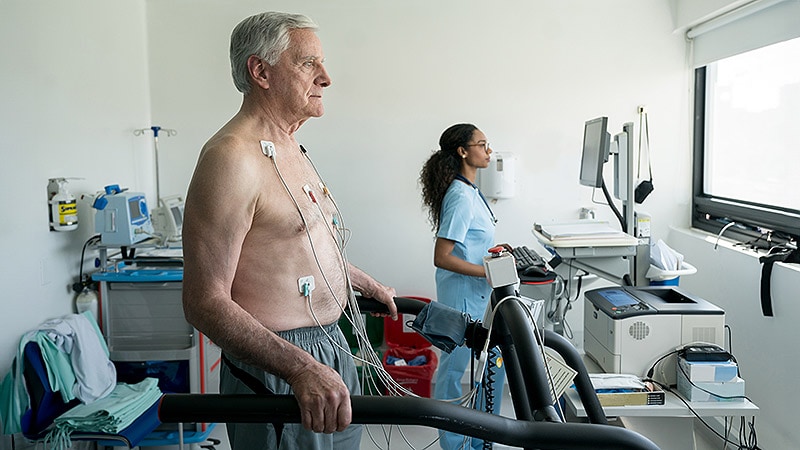Routine Stress Testing Post-PCI Study Findings
Core Concepts
Routine stress testing post-percutaneous coronary intervention (PCI) does not provide additional clinical benefits for high-risk patients.
Abstract
TOPLINE:
- No incremental clinical benefit from routine surveillance stress testing in high-risk patients post-PCI.
METHODOLOGY:
- Subanalysis of the POST-PCI trial comparing routine functional testing to standard care in 1192 patients with multivessel or left main CAD post-PCI.
TAKEAWAY:
- No difference in composite outcome at 2 years between functional testing and standard care groups.
- Higher rates of coronary angiography and repeat revascularization in the functional testing group at 1 year.
IN PRACTICE:
- Routine surveillance stress testing should be avoided in asymptomatic patients post multivessel or left main PCI.
SOURCE:
- Published in the Journal of the American College of Cardiology on February 26, 2024.
LIMITATIONS:
- Subgroup analysis may have been underpowered due to lower-than-expected primary endpoint events.
- Findings may not be applicable to women and only evaluated the impact at 1 year post-PCI.
DISCLOSURES:
- Study funded by grants from CardioVascular Research Foundation and Daewoong Pharmaceutical.
Customize Summary
Rewrite with AI
Generate Citations
Translate Source
To Another Language
Generate MindMap
from source content
Visit Source
www.medscape.com
No Benefit of Routine Stress Test After Complex PCI
Stats
The primary outcome was a composite of death, myocardial infarction, or hospitalization for unstable angina at 2 years.
At 2 years, there was no difference in the composite outcome between the functional testing and standard care group (6.2% vs 5.7%; HR, 1.09; 95% CI, 0.68-1.74; P = .73).
At 1 year, coronary angiography and repeat revascularization were > 2 times higher in the functional testing group compared to the standard care group.
Quotes
"Without any clinical signs or symptoms suggestive of stent failure or disease progression, routine surveillance stress testing should be avoided in patients who underwent multivessel or left main PCI." - Study authors
"The totality of evidence at this time underscores the lack of benefit of routine stress testing in asymptomatic patients." - Commentary author
Key Insights Distilled From
by Megan Brooks at www.medscape.com 03-08-2024
https://www.medscape.com/viewarticle/no-benefit-routine-stress-test-after-pci-high-risk-patients-2024a10004gz
Deeper Inquiries
What are the potential implications of these findings on current post-PCI surveillance protocols
The findings of the study suggest that there may not be an incremental clinical benefit from routine surveillance stress testing in high-risk patients post-PCI. This challenges the current post-PCI surveillance protocols that often include routine stress testing. If these results are widely accepted, it could lead to a shift in practice towards avoiding unnecessary stress testing in asymptomatic patients who have undergone multivessel or left main PCI. This could potentially streamline post-PCI care, reduce healthcare costs, and minimize patient inconvenience associated with unnecessary testing procedures.
How might the underrepresentation of women in the study impact the generalizability of the results
The underrepresentation of women in the study could limit the generalizability of the results to the broader population. Since women may have different responses to PCI and post-procedural care compared to men, the lack of adequate representation in the study population raises concerns about the applicability of the findings to female patients. It is essential to conduct further research specifically focusing on the impact of routine stress testing post-PCI in women to ensure that the recommendations derived from such studies are applicable to all patient demographics.
How can advancements in technology influence the need for routine stress testing in post-PCI patients
Advancements in technology, such as improved imaging modalities and biomarker assessments, have the potential to influence the need for routine stress testing in post-PCI patients. These technological advancements can provide more accurate and detailed information about the patient's cardiac health status without the need for invasive or stressful procedures like stress testing. Non-invasive imaging techniques like CT angiography and cardiac MRI, along with sensitive biomarkers, can offer valuable insights into the patient's cardiovascular health, potentially reducing the reliance on routine stress testing for post-PCI surveillance. As these technologies continue to evolve, they may play a significant role in reshaping post-PCI care protocols and optimizing patient outcomes.
0
